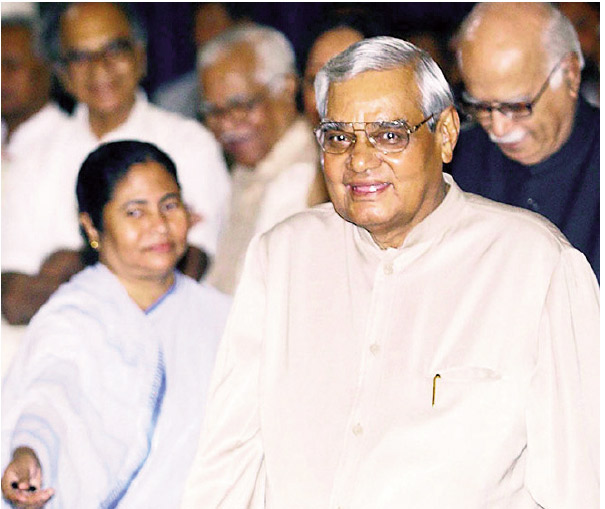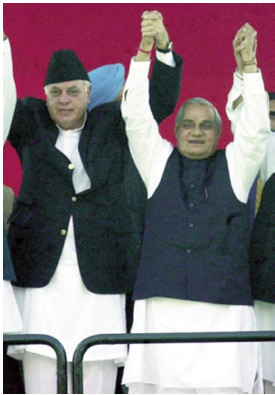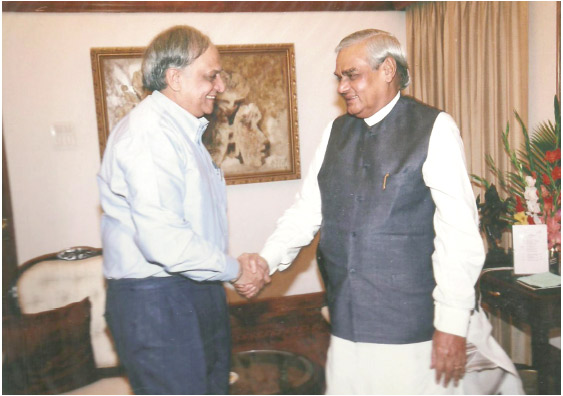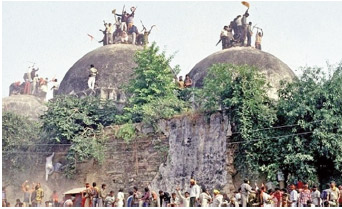Remembering Vajpayee as
India’s political role model
Hari Jaisingh
 In the country’s changing
political spectrum, we, the
people, will continue to
feel a big void in the
absence of Atal Behari
Vajpayee in our national
life. Atalji was the first BJP Prime
Minister of substance who
believed in and practised Raj
Dharma and the intricacies of
Statecraft. His was a different
personality – a genuinely
enlightened liberal Hindu at heart,
cast in a Nehruvian mould. That is
what grassroots India/Bharat is all
about.
In the country’s changing
political spectrum, we, the
people, will continue to
feel a big void in the
absence of Atal Behari
Vajpayee in our national
life. Atalji was the first BJP Prime
Minister of substance who
believed in and practised Raj
Dharma and the intricacies of
Statecraft. His was a different
personality – a genuinely
enlightened liberal Hindu at heart,
cast in a Nehruvian mould. That is
what grassroots India/Bharat is all
about.
Atalji represented an allinclusive
forward-looking modern
India, rooted in rich tradition
historically. That was the strength
of his a 26-party coalition of the
BJP-led National Democratic
Alliance (NDA). This was truly
Federal India that united all its
diverse political elements .
Atalji as PM enjoyed
tremendous support and goodwill
in the country’s complex multidimensional
coalition politics.
Even the maverick leader from
West Bengal, Mamata Banerjee,
was then part of the NDA
umbrella. So was Farooq Abdullah
of J & K’s National Conference.
Such was Vajpayee’s magnetic
personality and personal qualities
of heart and mind.
I am recalling the years of
Prime Minister Vajpayee for the
benefit of the present lot of BJP
leaders, including Prime Minister
Modi who all, I am sorry to say,
are yet to fully grasp the complex
ground realities of the Indian
polity as evolved over the
centuries. Nor do they seem to
have proper appreciation of the
broad liberal frame of Hinduism.
On top, what seems to have
got added to PM Modi’s
“Change India” agenda is onetrack
mindset of a section of the
Sangh Parivaar which wishes to
reverse the process of history in
one go by erasing what it
considers to be its “sore points”.
History provides us a mirror on
Atalji as PM enjoyed
tremendous support and
goodwill in the country’s
complex multidimensional
coalition
politics. Even the maverick
leader from West Bengal,
Mamata Banerjee, was
then part of the NDA
umbrella. So was Farooq
Abdullah of J & K’s
National Conference. Such
was Vajpayee’s magnetic
personality and personal
qualities of heart and
mind !
 Farooq Abdullah with Atal Behari
Vajpayee
past and present events, palatable
or otherwise. It helps to draw and
learn right lessons so that
mistakes and blunders committed
in the years gone by are not
repeated. But it so happens that
as a people we are poor learners
of history. Small wonder that we
repeat the mistakes and add to
the problems for the generation
next.
Farooq Abdullah with Atal Behari
Vajpayee
past and present events, palatable
or otherwise. It helps to draw and
learn right lessons so that
mistakes and blunders committed
in the years gone by are not
repeated. But it so happens that
as a people we are poor learners
of history. Small wonder that we
repeat the mistakes and add to
the problems for the generation
next.
Vajpayee was well aware of
harsh facts of history and in his
own poetic way, he looked for new
instruments of policies and
strategies to tackle problematic
areas that the nation has been
faced with. He had a vision, not
only of modern India but also of
the sub-continent. His bus yatra
to Lahore and the Agra summit
were part of his endeavour to
mend fences with a hostile
neighbour through the process of
reconciliation and dialogue.
It is a different matter that
General Parvez Musharaff happened to be too clever by half.
His Kargil misadventure and the
diplomacy of duplicity upset
Vajpayee’s peace process with
Islamabad. This has been
Pakistan’s never-ending tragedy ever since its birth on August 14,
1947.
 The author with the Prime Minister at 7, Race Course Road.
Its hate psyche-cumuntrustworthy
mindset has
thrown up jehadi terror monsters
of its own making. The heartrending
killings of innocent school
children at Peshawar by Taliban
jehadis do tell Pakistani leaders
how and where they have gone
wrong but, regrettably,
Islamabad’s military-cum-ISI
establishment continues to be
blindfolded and is still reluctant to
give up its policy of using the
instrument of terrorism as a state
policy, especially against India.
The author with the Prime Minister at 7, Race Course Road.
Its hate psyche-cumuntrustworthy
mindset has
thrown up jehadi terror monsters
of its own making. The heartrending
killings of innocent school
children at Peshawar by Taliban
jehadis do tell Pakistani leaders
how and where they have gone
wrong but, regrettably,
Islamabad’s military-cum-ISI
establishment continues to be
blindfolded and is still reluctant to
give up its policy of using the
instrument of terrorism as a state
policy, especially against India.
Amidst this gloomy setting, it is
worth recalling that I saw some
glimmer of hope in Vajpayee
among large sections of Pakistanis
during my visit to that country.
Looking back, I feel India-Pakistan
relations could have taken a
different turn had Vajpayee’s
government returned to power in
2004. Well, the dots of history do
not get filled in with ifs and buts.
History goes by its own
momentum, though a man of
vision and courage can definitely
change its course.
Vajpayee as Prime Minister
never allowed his philosophy of
Hindutva to get caged in a narrow
frame of politics and power.
For
him, Hinduism has always been a
vast canvas of ever green
liberalism. Hinduism actually
derives strength from its liberal
roots of tolerance and
understanding of other faiths. It is
flexible in approach as well as in
practice. Several streams of
thoughts and faiths have emerged
from the mainstream of Hinduism
in different periods.
Even the growth of Sufism in
Punjab, Sind, and Jammu and
Kashmir deserves special mention
since it symbolizes some of the
best thoughts of Hinduism and
Islam. Regrettably, organized
attempts by Islamist
fundamentalists have taken the
Kashmiris away from rich Sufi
thoughts and have led most of them into areas of intolerance.
 Babri Masjid demolition
It is, in fact, liberal parameters
which have put the concept of
Hinduism on a high pedestal of
life and thinking, the very basis of
India’s time-tested civilisational
roots. India is eternal and everlasting.
For Vajpayee, these were
not mere sentimental words.
Babri Masjid demolition
It is, in fact, liberal parameters
which have put the concept of
Hinduism on a high pedestal of
life and thinking, the very basis of
India’s time-tested civilisational
roots. India is eternal and everlasting.
For Vajpayee, these were
not mere sentimental words.
Indian culture is ageless. With his
firm belief in Raj Dharma in
Statecraft, Vajpayee was always
guided by the Indian spirit of
tolerance, understanding and
accommodation. He invariably
looked beyond the barriers of
caste, community and religion.
The challenge before the RSS-BJP
leadership today is how to widen
such liberal commitments of
evolving a consensus within the
Sangh Parivaar and the people of
other faiths and ideologies.
I am of the view that the basic
essence of liberal Indian tradition
need not be politicized. Nor
should it be given a deliberate
communal twist by varied players
among the opposition parties,
including the Congress. This is not
a matter of bargain. Of course,
within the old traditional mould
some new symbols could be
evolved. Nehru did so by calling
dams and factories as “new
temples” of modern India.
PM
Modi’s stress has been on Vikas,
Parivartan and Su-shashan
(Good Governance). We hope that
he would redeem his promises.
Vajpayee espoused a moderate
line against the hardline Hindu
position of some of his party
colleagues. The most striking
example of this was his stance on
the Babri Masjid demolition.
He
described the incident as India’s
“darkest hour”. No wonder, many
ideological opponents have gone
out of the way to praise Vajpayee’s
political, social and humanitarian
philosophy of life. Vajpayee’s
approach was invariably laid back
and conciliatory. This is a great
lesson that the present
set of Sangh Parivaar leaders would do well to learn.
Vajpayee espoused a
moderate line against the
hardline Hindu position
of some of his party
colleagues. The most
striking example of this
was his stance on the
Babri Masjid demolition.
He described the incident
as India’s “darkest hour”.
No wonder, many
ideological opponents
have gone out of the way
to praise Vajpayee’s
political, social and
humanitarian philosophy
of life. Vajpayee’s
approach was invariably
laid back and conciliatory.
This is a great lesson that
the present set of Sangh
Parivaar leaders would
do well to learn.
It may be worth remembering
that Vajpayee began his public
career as a journalist. His
background as a media person
with Delhi’s daily Veer Arjun in
the early fifties probably gave him
the rare quality of reaching out to
persons of diverse backgrounds
and varied views and opinions.
A swadeshi to the core,
Vajpayee’s multi-faceted
personality, non-partisan
characteristic and broad-minded
approach to men, matters and
issues put him on a high pedestal
of India’s political spectrum. This
is a rare feat which few Indian
political leaders have been able to
achieve.
As Editor of The Tribune, I had
several opportunities to interact
with Vajpayee at 7, Race Course
Road and during his foreign visits.
This enabled me to size him up
objectively as a visionary person
and a statesman who nursed a
wish to shape India’s destiny as a
modern forward-looking nation.
In this pursuit, he was always
willing to listen to different
viewpoints as well as criticism.
What is important to note is
Vajpayee’s responsive attitude
and open-mindedness on complex
national matters. His
understanding of India’s ground
realities was unique. He could feel
the people’s heartbeats in
different parts of the country.
It is time to listen afresh to the
heartbeats of the poor, the
backwards, tribals and deprived
and disprivileged sections of our
society who have been fed on
“dreams” of change for 72 years
since Independence.
We have to translate their
“dreams” into joyous realities of
their life speedily and without fail.
India can no longer live by
rhetoric of our politicians. The
sole mantra for India today has to
be Just, Fair, Transparent, Swift
and Honest Action for a
Better Tomorrow.





 Farooq Abdullah with Atal Behari
Vajpayee
Farooq Abdullah with Atal Behari
Vajpayee
 The author with the Prime Minister at 7, Race Course Road.
The author with the Prime Minister at 7, Race Course Road.
 Babri Masjid demolition
Babri Masjid demolition